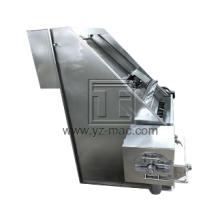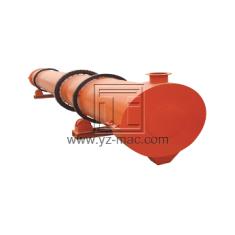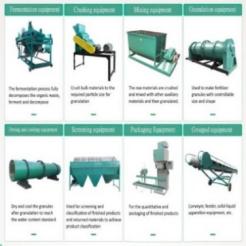Double roller granulator
The double roller granulator is a highly efficient machine used in fertilizer production processes. It plays a crucial role in the granulation of various materials, transforming them into uniform, compact granules that are easy to handle, store, and apply.
Working Principle of the Double Roller Granulator:
The double roller granulator consists of two counter-rotating rollers that exert pressure on the material fed between them. As the material passes through the gap between the rollers, it is compressed, forming compacted sheets or flakes. These sheets are then broken into small granules as they are forced through the screen underneath the rollers. The size of the granules can be adjusted by varying the pressure and the size of the screen.
Advantages of the Double Roller Granulator:
High Granulation Efficiency: The double roller granulator offers high granulation efficiency due to its unique design and operating principle. The continuous squeezing and crushing action of the rollers ensures uniform granule formation and prevents material segregation, resulting in high-quality granules with consistent size and shape.
Versatile Material Compatibility: The double roller granulator can handle a wide range of materials, including various types of fertilizers, such as compound fertilizers, organic fertilizers, and biofertilizers. It can also process materials with different moisture contents, ensuring flexibility in fertilizer production.
Improved Nutrient Availability: The granulation process of the double roller granulator helps improve the availability and release of nutrients in the granules. The compacted structure of the granules reduces nutrient losses during storage and transportation, ensuring a more efficient and effective fertilizer product.
Simplified Production Process: With the double roller granulator, the granulation process is simplified and streamlined. It combines compaction and granulation into a single operation, eliminating the need for additional steps or equipment, thereby reducing production costs and enhancing overall efficiency.
Applications of the Double Roller Granulator:
Agricultural Fertilizer Production: The double roller granulator is extensively used in the production of agricultural fertilizers. It can convert various raw materials, such as ammonium sulfate, ammonium phosphate, urea, and potassium chloride, into granules suitable for crop nutrient supplementation.
Organic Fertilizer Production: The double roller granulator is an excellent choice for organic fertilizer production. It can process organic materials, such as animal manure, crop residues, and food waste, into uniform organic granules rich in essential nutrients and beneficial microorganisms.
Compound Fertilizer Production: Compound fertilizers, which consist of a combination of nitrogen, phosphorus, and potassium, are commonly produced using the double roller granulator. The granulator enables the efficient blending and granulation of different raw materials, ensuring a balanced nutrient composition in the final compound fertilizer product.
Biofertilizer Production: The double roller granulator is also suitable for the production of biofertilizers, which contain beneficial microorganisms that enhance soil fertility and plant growth. It can process biofertilizer ingredients, such as microbial inoculants and organic additives, into granules that provide a controlled release of beneficial microorganisms.
The double roller granulator is a highly efficient machine that plays a crucial role in fertilizer production processes. With its ability to produce uniform, compact granules, it offers advantages such as high granulation efficiency, versatile material compatibility, improved nutrient availability, and simplified production processes. The double roller granulator finds applications in agricultural fertilizer production, organic fertilizer production, compound fertilizer production, and biofertilizer production. By utilizing this innovative granulation technology, fertilizer manufacturers can enhance their production efficiency, produce high-quality fertilizers, and contribute to sustainable agriculture practices.








